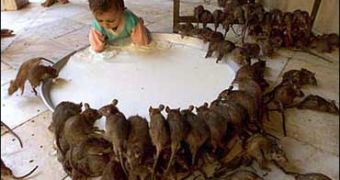Contamination can affect wildlife where it hurts most for the males: sexual success.
And this for generations...
A team from The University of Texas at Austin have found that female rats avoid males whose great-grandfathers were affected by a common fruit crop fungicide, named vinclozolin, preferring instead males with an uncontaminated ascendancy.
Drs. David Crews and Andrea Gore examined mate behavior rats whose great-grandparents experienced vinclozolin contamination, which triggers early onset of cancer and kidney disease in males.
Female rats were found to recognize male descendants of rats that had been exposed to vinclozolin and strongly preferred males descended from unexposed rats. "Even across generations, your attractiveness as a mate is decreased if your great-grandfather has been exposed to environmental chemicals. That will have an impact on your ability to reproduce and could take you out of the gene pool," said Gore, professor of pharmacology and toxicology in the College of Pharmacy.
Vinclozolin induces changes in the males' sperm cells but the fungicide does not act directly on DNA, but instead affects the elements that regulate genes (epigenetic changes).
The early onset of disease provoked by initial exposure to vinclozolin was transmitted from generation to generation through the sperms of the males. This is the first time an inherited epigenetic change was shown to affect behavior. "The important thing about this research is that it takes epigenetics to the brain," said Crews, the Ashbel Smith Professor of Integrative Biology in the College of Natural Sciences. "The female is able to detect which male is likely to get early onset disease and which male is not before they show any manifestation of disease."
"The female rats can sense something is wrong, although they can't see it," said Gore.
Males do not display any preference for female type. "That has consequences for evolution, because it shows that females are selecting males on the basis of an epigenetic imprint as opposed to genetic changes," said Crews.
Male rats generally leave their family looking to other populations to mate. In nature, the effect of vinclozolin exposure would be widespread by the male migration. "Males disperse, and if they were to mate, it would be at times that they aren't manifesting signs of disease. They are literally time bombs", said Crews.

 14 DAY TRIAL //
14 DAY TRIAL //